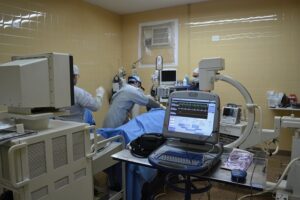The Role of Family in Supporting ARDS Patients in the ICU
The Role of Family in Supporting ARDS Patients in the ICU
Acute Respiratory Distress Syndrome (ARDS) is a severe and often life-threatening condition characterized by widespread inflammation in the lungs, leading to impaired oxygenation of the blood and necessitating intensive medical intervention. Patients with ARDS frequently find themselves in an Intensive Care Unit (ICU), where they may be placed on mechanical ventilation and closely monitored. For families, witnessing a loved one struggle with this debilitating condition is often fraught with anxiety, confusion, and helplessness. Understanding the role that family members can play in supporting ARDS patients not only helps strengthen the patient’s emotional well-being but can also significantly influence their overall recovery process.
In this article, we will explore how families can engage effectively in the care of ARDS patients in the ICU, the emotional and psychological considerations that come into play, and the essential actions family members can take to support both their loved ones and themselves during this difficult time.
Understanding ARDS: A Brief Overview
Before delving into the various ways families can support ARDS patients in the ICU, it is crucial to understand the nature of this condition. ARDS can result from several causes, including pneumonia, sepsis, and trauma. It leads to fluid accumulation in the lungs’ alveoli, impeding the transfer of oxygen into the bloodstream. This critical condition typically requires mechanical ventilation and may involve a long, tough recovery process.
Recognizing the challenges behind ARDS helps families better prepare for what lies ahead. It is vital to understand the potential complications, treatment options, and the likelihood of recovery. Families who are well-informed can provide more effective emotional and moral support.
- Recognize the primary causes of ARDS, including infections and non-pulmonary causes.
- Understand the potential complications, such as nosocomial infections and long-term pulmonary function impairment.
- Learn about treatment options, including mechanical ventilation strategies like low tidal volume ventilation.
The Importance of Presence
One of the simplest yet most impactful ways families can support ARDS patients is through their physical presence. Hospitals can often feel sterile and isolating, amplifying the fears experienced by patients. Regular visits from family members can provide a sense of comfort and normalcy in an environment marked by uncertainty.
Presence means more than just being in the same room. Engaging in conversations, holding the patient’s hand, and encouraging them can help bridge the emotional gap created by illness. Additionally, sensitive touch—such as gentle handholding or a comforting shoulder—can communicate love and support when words may seem inadequate. This kind of emotional support can go beyond merely providing comfort; studies have shown that patients who receive family support often experience shorter lengths of stay and better mental health outcomes.
- Schedule regular visits, taking care to coordinate with ICUs’ visiting hours and regulations.
- Communicate positively and encourage conversations when appropriate.
- Share meaningful memories or stories to create familiar connections.
Understanding the Medical Environment
Understanding the medical environment in which their loved one is being treated plays a critical role for family members. ICUs can be overwhelming, filled with beep sounds of machines, and the sight of various medical instruments can lead to additional anxiety. Therefore, family education on the ICU setup, medical terminologies, and treatment plans becomes essential. Familiarity with the medical environment can relieve some anxiety for both the patient and the family.
Family members should feel empowered to ask the healthcare team questions about the condition, treatment options, and potential outcomes. Open communication helps families become advocates for their loved ones, ensuring that care is not only focused on medical needs but also considers their emotional and psychological well-being.
- Request a family meeting with the healthcare team to discuss treatment plans and what to expect.
- Keep a journal of the patient’s condition and interventions to share updates with other family members.
- Educate themselves about ICU protocols, equipment, and medical terms to ask informed questions.
Supporting Patients’ Emotional Health
The emotional impact of being in an ICU can be profound for patients diagnosed with ARDS. Feelings of fear, isolation, and helplessness can overwhelm them, which may impede their recovery. As such, families should strive to support their loved one’s emotional health and well-being. This can be achieved through simple yet effective means.
Encouraging patients to express their thoughts can provide an outlet for fear and anxiety. Activities such as journaling, drawing, or using pictures to communicate can be excellent ways for patients to articulate their feelings. Family members should also be patient and empathetic, recognizing that the patient may not react as they usually would.
- Encourage the use of art or word expressions to facilitate emotional articulation.
- Listen actively to verbal and non-verbal cues from the patient.
- Celebrate small milestones in recovery to foster hope and motivation.
Fostering a Team Approach to Care
The role of family members in the ICU shouldn’t be viewed as passive observers; instead, they should see themselves as integral parts of a team. Engaging healthcare providers in discussions about the patient’s care will help families and staff to work collaboratively towards a common goal: recovery and rehabilitation.
A supportive family dynamic provides a crucial buffer between the patient and the stress of the medical environment. Families can contribute essential information regarding the patient’s medical history, preferences, and needs, which healthcare providers may not access. Moreover, families can help enforce and carry out care plans in a way that suits the patient best.
- Foster open lines of communication with healthcare providers.
- Document all interactions and care plans to keep track of the patient’s progress.
- Participate in decision-making, where appropriate, to advocate for the patient’s needs.
Caring for Family Members
While focusing on the patient is undoubtedly essential, families must also prioritize their well-being. The emotional toll of having a loved one in the ICU can be immense, leading to stress, anxiety, and burnout among family members. Recognizing the signs of emotional distress and taking proactive steps for self-care is vital.
Establishing support systems for family members, such as support groups or counseling, can help them navigate the emotional rollercoaster of ICU life. Encouraging breaks and providing tools for stress management, such as meditation or breathing exercises, can go a long way toward ensuring that families can be effective supporters of their loved ones.
- Utilize hospital resources such as chaplains or social workers for emotional support.
- Set boundaries to avoid burnout, allowing for self-care and personal time.
- Participate in family support groups to connect with others who are facing similar challenges.
FAQs About Family Support in ARDS Care
Q: How can family members assist with communication if the patient is on a ventilator?
A: Family members can use non-verbal communication methods such as writing, eye movements, or communication boards to express thoughts and feelings, assisting the patient in feeling connected despite their limitations.
Q: What role can family members play in decision-making regarding treatment?
A: Family members can provide essential insights into the patient’s values, preferences, and medical history, allowing them to participate meaningfully in conversations about care options.
Q: How can family members cope with their emotional stress?
A: Family members should prioritize self-care, establish support networks, and consult with healthcare professionals about available counseling resources.
Conclusion
Being part of an ARDS patient’s journey in the ICU can be daunting for families, but it is also an opportunity to provide invaluable support during a critical time. By understanding the condition, engaging actively with the healthcare team, fostering a supportive environment, and prioritizing their well-being, families can help facilitate a more positive outcome for their loved ones. The emotional landscape of such a journey can be challenging, yet it is filled with opportunities for connection, advocacy, and love.
The road ahead may be fraught with challenges, but families should know that their involvement is crucial to both the patient’s recovery and their emotional well-being. By equipping themselves with knowledge, nurturing their loved ones, and caring for their emotional health, families become pivotal players in the fight against ARDS.
For further reading, consider exploring resources available at the ARDS Foundation (ardsfoundation.org) or any reputable medical centers’ websites, which often provide in-depth articles on ARDS and family involvement in critical care.
About ARDS and Post-ARDS
ARDS (Acute Respiratory Distress Syndrome) is a life-threatening condition typically treated in an Intensive Care Unit (ICU). While ARDS itself is addressed during the ICU stay, recovery doesn’t end with discharge; patients then embark on a journey of healing from the effects of having had ARDS.
Disclaimer
The information provided in ARDS Alliance articles is for general informational and educational purposes only and is not a substitute for professional medical advice, diagnosis, or treatment. While we strive to present accurate, current information, the field of Acute Respiratory Distress Syndrome (ARDS) and related healthcare practices evolve rapidly, and ARDS Alliance makes no guarantee regarding the completeness, reliability, or suitability of the content.
Always seek the advice of qualified healthcare professionals with any questions you may have regarding a medical condition. Never disregard professional medical advice or delay seeking it because of information you read in ARDS Alliance articles. ARDS Alliance, its authors, contributors, and partners are not liable for any decision made or action taken based on the information provided in these articles.
About ARDS Alliance
Our mission is to improve the quality of life for ALL those affected by ARDS.
The ARDS Alliance is a non-profit committed to raising awareness and enhancing the understanding of Acute Respiratory Distress Syndrome (ARDS), a severe lung condition often occurring in critically ill patients. Through developing alliances, it unites various organizations and experts striving to improve care and support research aimed at finding more effective treatments. Their efforts include educating the public and healthcare providers about ARDS symptoms, risk factors, and advancements in treatment, ensuring better patient outcomes and resource availability.

I am committed to improving the lives of those affected by acute respiratory distress syndrome. Our organization provides resources and support to patients, families, and healthcare professionals. Together, we work towards raising awareness and advancing research in order to find better treatments and ultimately a cure.
~ Paula Blonski
President, ARDS Alliance





